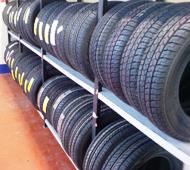 | « Back to article | Print this article |
 Indian tyre companies said on Thursday that their wishlist from the Union Budget includes a reduction in import duty on natural rubber and fund allocation for incentivisation of domestic manufacturing of radialisation in truck and bus tyres.
Indian tyre companies said on Thursday that their wishlist from the Union Budget includes a reduction in import duty on natural rubber and fund allocation for incentivisation of domestic manufacturing of radialisation in truck and bus tyres.
The Budget is slated to be presented by the Union finance minister Pranab Mukherjee on February 26.
"We seek a correction in duty anomaly through a reduction in customs duty on natural rubber from 20 per cent to 7.5 per cent. Alternately, we have suggested an increase in customs duty on tyres from the existing rate of 10 per cent to 20 per cent," Automotive Tyre Manufacturers' Association director general Rajiv Budhraja told PTI in Mumbai.
Presently, customs duty on natural rubber, the principal raw-material for tyres is 20 per cent, whereas the customs duty on tyres (the finished product) is 10 per cent, or even lower depending upon preferential/concessional tariff under various regional/bi-laterial trade agreements.
If customs duty on natural rubber is not reduced, an increase in duty on tyres (finished product) would also benefit tyre companies, he said.
"The government should earmark funds for incentivisation of domestic manufacturing of radialisation in the truck and bus tyre segments," Budhraja added.
According to ATMA, an increase in level of radialisation from the present rate of eight to 10 per cent to 25 per cent can result in fuel savings for the country to the extent of Rs 20,000 crore (Rs 200 billion).
Therefore, policy support for radialisation in the commercial vehicle segment should be taken up as a key priority area by the government, he said. Leading tyre-maker, JK Tyre, said, "We expect the government to continue its stimulus packages for some more time to fuel growth momentum in India's economy.
"Withdrawal means price increase of tyres which will, in turn, impact cost of transportation of every product," JK Tyre & Industries' director (marketing), A S Mehta, said. Any cost increase would push-up inflation, he said.
"Further cost increase would accelerate inflation and that would adversely impact the economy in general," Mehta said.
Kolkata-based Dunlop Group's chairman Pawan K Ruia said the government should reduce import duty on natural rubber at 10 per cent from 20 per cent as tyre-demand is increasing day-by-day.
"If the government likes to promote the auto industry then why not tyres," Ruia asked. According to ATMA, an increase in level of radialisation from the present rate of eight to ten per cent to 25 per cent can result in fuel savings for the country to the extent of Rs 20,000 crore (Rs 200 billion).
Therefore, policy support for radialisation in the commercial vehicle segment should be taken up as a key priority area by the government, he said.
Leading tyremaker JK Tyre said, "We expect the government to continue its stimulus packages for some more time to fuel growth momentum in India's economy."
On tyre prices, Ruia said, "Any change in tyre prices is an outcome of change in price of raw materials as well as taxes and duties."
A duty-free natural rubber import would enable the Indian tyre industry to be competitive, another tyre-maker, Ceat (a RPG Group company), said.
"If duty-free on natural rubber import is not allowed, the competitiveness of the Indian industry will take a severe hit," Ceat's managing director Paras Chowdhary said. Presently, the tyre industry that consumes 57 per cent of the natural rubber produced in the country is facing its worst-ever raw material availability crisis.
For the latest on Budget 2010-11, click here!